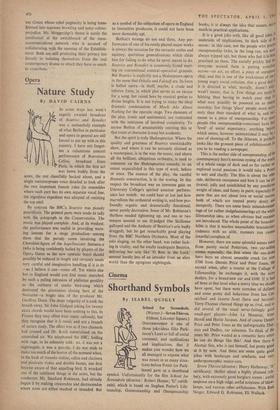Cinema
Shorthand Symbols
By ISABEL Q UIGLY
School for Scoundrels.
(Warner.)—Seven Thieves. books, it is always the idea that counts, not so much its practical applications. It is a good joke with, like all good jokes, is underside of implications, its dark side of the moon: in this case, not the people who prachst oneupmanship (who, in the long run, are surds' always tripped up), but those who feel it is bela1 practised on them. The socially prickly feel th3t everyone around them is putting somethinl across—an act, an effort, a piece of oneurns4b• ship; and this is one of the weaknesses of inael young angry social criticism, that a good deal it is directed at what, morally, doesn't exist wasn't meant, that is. Few things are more in' hibiting than having to watch your step inf what may possibly be pounced on as once manship; few things 'place' people more aeon. ately than their standard of what is, and isn't' meant as a piece of oneupmanship. For man) people (the oneupmanship-conscious) have their, 'level' of social expectancy, anything beyond which seems, however unintentional it may be, 3 case of showing-off. To the illiterate, it probabh looks like the grossest piece of exhibitionism for you to be reading a newspaper. This is the nether side of oneupmanship, of the contemporary hero's envious eyeing of the world, of a whole range of dark and so far rather tl" explored social passions it would take a Proust to sort and clarify. The film is about the other side, deliberate oneupness and how it can be al' tivated; jolly and uninhibited by any ponderous weight of ideas, and funny in parts, especially the parts that are not about love or social success, both of which are treated pretty dimly and inexpertly. There are some basic misunderstand' ings of (or rather sledgehammerings at) the whole lifemanship idea, as when obvious bad manner' are introduced. The whole point of the bounder, bible is that it teaches unassailable bounderis0 rudeness with an alibi, manners you cannot (exactly) complain of.
However, there are some splendid scenes awaY from purely social Potterism, two car-selling scenes especially, the first when the one-dog/0 hero buys an almost unusable crock for over £700 from Dennis Price and Peter Jones, the, second when, after a course at the College 01 Lifemanship, he exchanges it, with the same dealers, for a brand-new car and £100. If it had all been at that level what a merry time we should have spent, but there were stretches of dullness and some pretty dull behaviour from Ian Car' michael and Janette Scott (hero and heroine).
Terry-Thomas cheered things up as rival, and a° did several of the usual never-failingly good small-part players—John Le Mesurier, Irene Handl and Hattie Jacques. And of course Dennis Price and Peter Jones as the unforgettable DUO' scan and Dudley, car salesmen. To think of the years Mr. Price wasted as a romantic hero when he can do things like this! And then there iS Alastair Sim, who is just himself, but pretty good at it by now. And there are some quite good jokes with landscape and artefacts, and veil anthropomorphic motor-cars. Seven Thieves (director : Henry Hathaway; 'A' certificate): thriller about a highly planned rob' bery, with extremely good burglary scenes: awful suspense on a high ridge, awful noisiness of blow' lamps, and various other awfulnesses. With Rod Steiger, Edward G. Robinson, Eli Wallach.


































 Previous page
Previous page